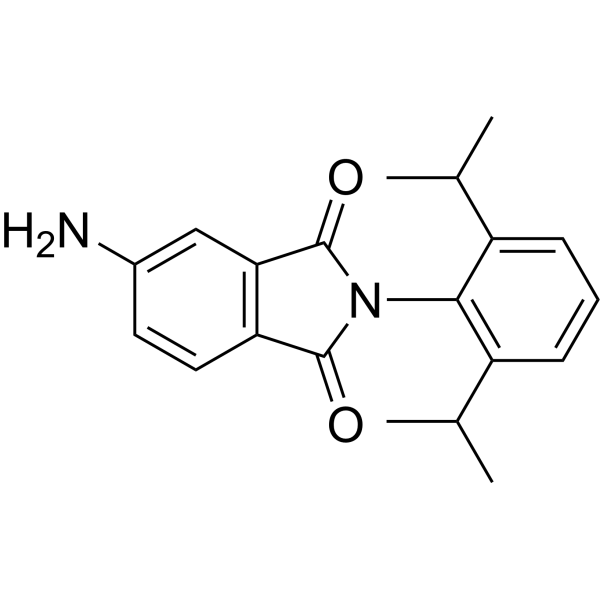Physicochemical Properties
| Molecular Formula | C20H22N2O2 |
| Molecular Weight | 322.40 |
| Exact Mass | 322.168 |
| CAS # | 100823-03-8 |
| PubChem CID | 1235479 |
| Appearance | White to yellow solid powder |
| LogP | 4.962 |
| Hydrogen Bond Donor Count | 1 |
| Hydrogen Bond Acceptor Count | 3 |
| Rotatable Bond Count | 3 |
| Heavy Atom Count | 24 |
| Complexity | 486 |
| Defined Atom Stereocenter Count | 0 |
| InChi Key | NRPIRIUWEKTNGQ-UHFFFAOYSA-N |
| InChi Code | InChI=1S/C20H22N2O2/c1-11(2)14-6-5-7-15(12(3)4)18(14)22-19(23)16-9-8-13(21)10-17(16)20(22)24/h5-12H,21H2,1-4H3 |
| Chemical Name | 5-amino-2-[2,6-di(propan-2-yl)phenyl]isoindole-1,3-dione |
| HS Tariff Code | 2934.99.9001 |
| Storage |
Powder-20°C 3 years 4°C 2 years In solvent -80°C 6 months -20°C 1 month Note: This product requires protection from light (avoid light exposure) during transportation and storage. |
| Shipping Condition | Room temperature (This product is stable at ambient temperature for a few days during ordinary shipping and time spent in Customs) |
Biological Activity
| Targets | CDK1 Caspase-9 MCL1 |
| ln Vitro | In KMS34 cells, TC11 (0~30 μM; 24 hours) causes cell death[1]. TC11 (5 μM; 0~48 hours; KMS34 cells) causes M arrest and downregulates MCL1 expression as well as an apoptotic pathway that leads to cell death[1]. |
| Cell Assay |
Cell Viability Assay[1] Cell Types: KMS34 cells Tested Concentrations: 0~30 μM Incubation Duration: 24 hrs (hours) Experimental Results: Induced cell death. Western Blot Analysis[1] Cell Types: KMS34 cells Tested Concentrations: 5 μM Incubation Duration: 0~48 hrs (hours) Experimental Results: Induced cell death occurs through an apoptotic pathway and downregulated MCL1 expression. Cell Cycle Analysis[1] Cell Types: KMS34 cells Tested Concentrations: 5 μM Incubation Duration: 24 hrs (hours) Experimental Results: Induced M arrest. |
| References |
[1]. A phenylphthalimide derivative, TC11, induces apoptosis by degrading MCL1 in multiple myeloma cells. Biochem Biophys Res Commun. 2020;521(1):252-258. [2]. A phthalimide derivative that inhibits centrosomal clustering is effective on multiple myeloma. PLoS One. 2012;7(6):e38878. |
Solubility Data
| Solubility (In Vitro) | DMSO : 50 mg/mL (155.09 mM) |
| Solubility (In Vivo) |
Solubility in Formulation 1: ≥ 2.5 mg/mL (7.75 mM) (saturation unknown) in 10% DMSO + 90% Corn Oil (add these co-solvents sequentially from left to right, and one by one), clear solution. For example, if 1 mL of working solution is to be prepared, you can add 100 μL of 25.0 mg/mL clear DMSO stock solution to 900 μL of corn oil and mix evenly. (Please use freshly prepared in vivo formulations for optimal results.) |
| Preparing Stock Solutions | 1 mg | 5 mg | 10 mg | |
| 1 mM | 3.1017 mL | 15.5087 mL | 31.0174 mL | |
| 5 mM | 0.6203 mL | 3.1017 mL | 6.2035 mL | |
| 10 mM | 0.3102 mL | 1.5509 mL | 3.1017 mL |
